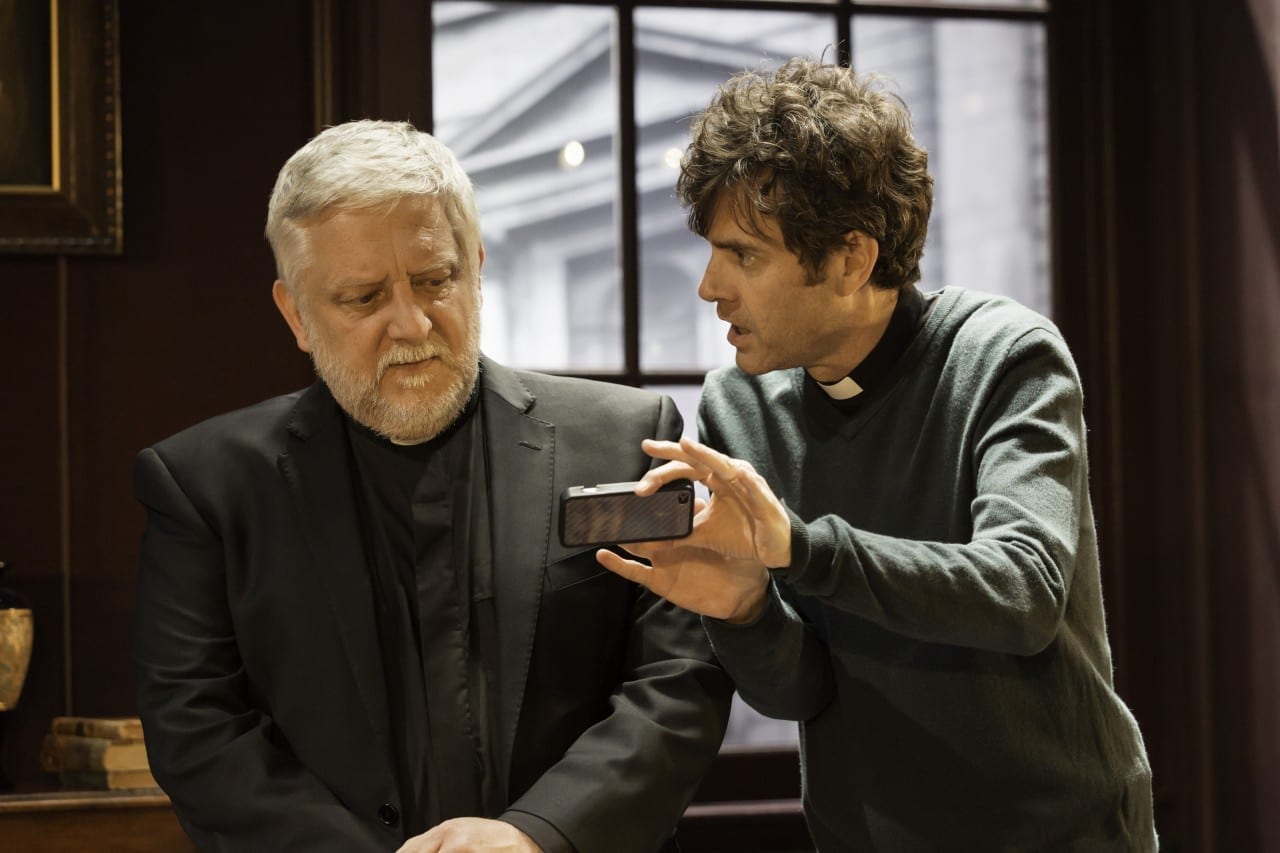The Donmar consistently demonstrates some of the most beautiful set design in the West End, transforming the space every production, and Temple is no exception. The set is an old-fashioned conference room, full of large windows that open onto St Paul’s, giving a sense of depth and reality to the play that is enhanced by its uninterrupted ninety-minute run. The play starts in complete darkness, choral music ringing sonorously through the space, and gradually the hunched figure of the Dean (Simon Russell Beale) is revealed, staring out of the window at the rising sun and the rising noise of the protest below.
Temple focuses on the Occupy protest outside St Paul’s – specifically, the several hours before the Dean decided to reopen the cathedral and side with The City in opening injunctions against protestors. A play about Occupy – a movement which has rapidly faded from the collective consciousness – may seem somewhat passé, but Waters’ focus on the agonised decisions of the Dean gives the proceedings a new dimension, bringing a fresh take to both the workings of the church and the somewhat incoherent aims of Occupy.
A large chunk of the play is focused on the minutiae of inter-church politics, and although a fair amount of knowledge is assumed, the Dean’s wry asides on the subject provoke great laughter from the audience. Beale is magnificent, a magnetic stage presence who makes perfectly clear the enormous mental and physical toll the unfolding events have had on the Dean. He begins as calmly studious, but it becomes apparent that this is a façade that he can no longer uphold in private, no matter how many times he attempts to rebuild it. As the performance progresses, Beale’s voice takes on a fragile quality and his body seems to shrink, the emotion increasingly close to the surface. The intensity of how personal this is for him – and the Canon Chancellor (the brilliantly volatile Paul Higgins) – is brought into sharp contrast with the flippancy of the lawyer (Shereen Martin), for whom this is nothing more than a job to be done.
Although this is, centrally, a play revolving around the dilemma of one man within the Church of England, necessarily it brings in the larger themes of free speech and right to protest. Much of this is voiced by the left-wing Canon Chancellor, who sees the presence of the protestors as an exciting opportunity, but these themes also find their voice in Lizzie, the Dean’s PA (Rebecca Humphries). She is initially presented as endearingly wrong-footed and semi-incompetent, an inadvertent foil to the seriousness of the church. It is the kind of cliché normally seen in office-set chick flicks, but quickly develops to become far more than that. The moments where she speaks out are powerful and often insightful, bringing something coherent to the muddled sounds of the camp outside. The sound design is effective throughout, as is the incorporation of social media – which played such a large part in the Occupy movement – without being gimmicky or overly technical.
The overriding emotion present in Temple is frustration: frustration at not being able to raise the church above politics, frustration that the church is not engaging more with politics, frustration at the church’s link with The City, and frustration at the inchoate nature of Occupy. The Dean’s careful world – the world of countless years of tradition – dissolves before him, and he is unable to put it back together.
This is a play full of weighted silences and unabashed emotion – the latter, perhaps, is not what we expect from the High Church, but it is a reminder that beneath its corporate nature and ceremonies lie human hearts. As the religious leaders troop out at the end of the play, the Dean’s need to “speak to the world […] about what we’re here for” takes on an odd finality, as if this is the tipping point. But, as the room darkens once more, the play ending as it began, St Paul’s is the last thing we lose sight of. If it can endure the events of this play then, perhaps, it can endure anything.

